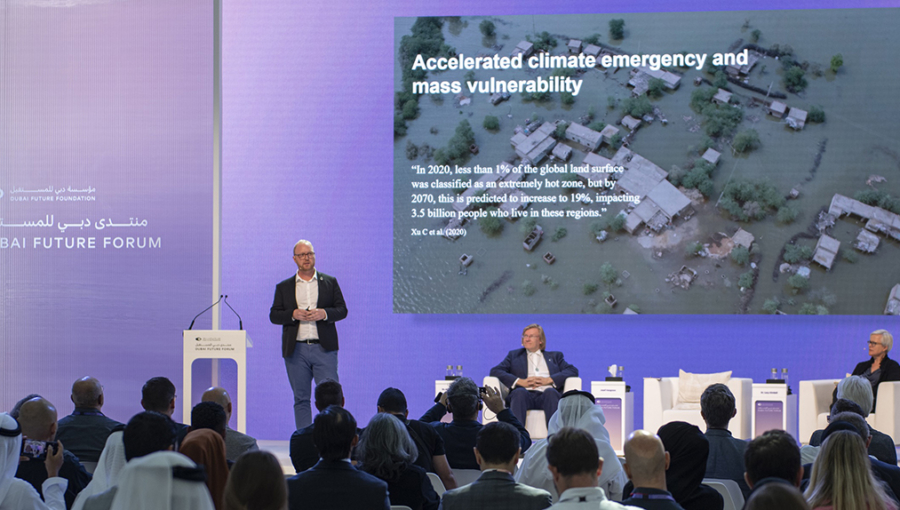Critical risks taught people new lessons in identifying risks and moving from insight to action, panel hears during the Dubai Future Forum
The success of the UAE and Dubai is a result of the trust people have in the government to make the right decisions for the future. The pandemic, supply chain shocks, the climate crisis and geopolitical upheaval have forced people to learn new lessons not only in identifying risks but supporting the movement from insight to action, Michael Costigan, VP – Salesforce Futures, Salesforce, said during the Dubai Future Forum today.
At a panel titled ‘Critical Risks: How to Move from Insights to Action?’, Costigan was joined by Shermon Cruz, Chair of the Association of Professional Futurists, and Alisha Bhagat, Future Lead at Forum for the Future.

Cruz said: “Risks are open, and foresight is open-ended. They are both perpetual and infinite. It is essential to generate strategies to gain the confidence to deal with risk in the future. We cannot choose our crises. Developing future capabilities can help intersect risks and interact better. If one can gamify the risks, it can help enhance the ability and capability to manage them better.”
While Bhagat added: “The intense disruption caused by the COVID-19 pandemic has left very little untouched and gave us the mindset on how to emerge from the risks – to pause and decipher new ways to do things in a better way. It is up to each of us to conceive of and act towards preferred futures. It is the mindset on how you emerge from the risks.”
Facing Existential Risks
In another panel discussion titled ‘What is the Biggest Existential Risk That We Are Facing Today?’, Dr Andres Sandberg, Senior Research Fellow at Future of Humanity Institute, said: “There are too many risks affecting our future. We must focus on saving the future in our lifetime. The people don’t think about the future because they believe it will not affect them. They see the future as something far away, something that is another generation’s problem.”
Also speaking on the panel, Josef Hargrave, Director and Global Foresight Leader at Arup, said: “The decisions we make today will change our future, and people do not recognize that at all. That is the most dreadful thing about humanity today. We must design a regenerative future.”
Technologies Powering the Future
In another panel titled ‘How Much Will Your Data Be Worth in the Future’, experts opined that data could be shared better and more efficiently to enhance productivity.
Astha Kapoor, Co-Founder of Aapti Institute, said: “The volume of data today warrants alternative approaches to data governance that go beyond current data protection regulations. There are a lot of questions around the technological infrastructure that need to be in place, allowing buying data or delegating consent. We are in the process of figuring this out in various jurisdictions.”
Professor Sylvie Delacroix, Co-Chair, Data Trusts Initiative, also said it was important to enable people to “choose” whether they trust data enough. However, “there will be people for whom the top priority is to maximize the financial returns on data,” she added.
Organized by the Dubai Future Foundation, the Dubai Future Forum is running from 11-12 October at Dubai’s Museum of the Future. It is hosting more than 400 experts and brings together more than 70 speakers and 45 global institutions.
